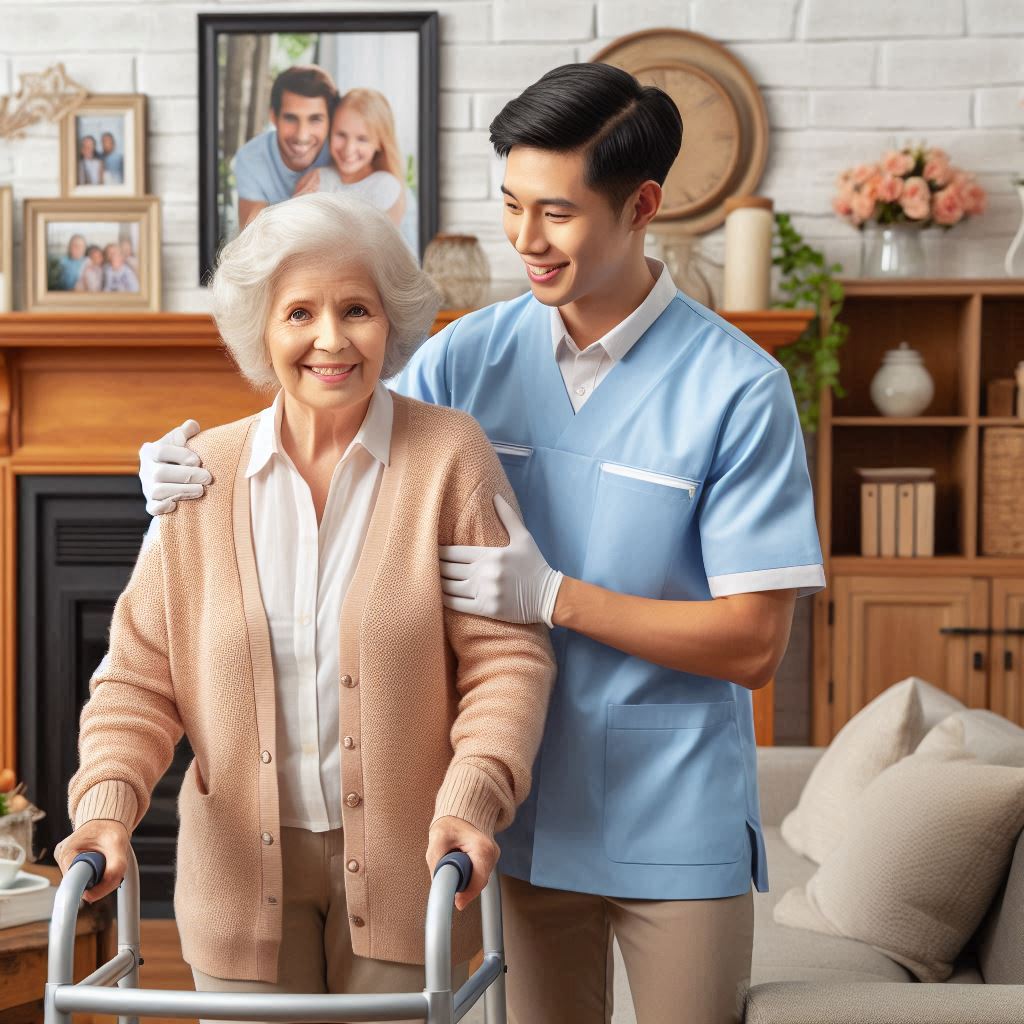Introduction
Importance of home health aides in providing care for individuals in need of assistance at home
Home Health Aides are indispensable in healthcare, offering crucial assistance to individuals who need help with daily activities.
They enable patients to maintain their independence and dignity within the familiar surroundings of their homes, promoting a higher quality of life.
Certain skills are essential for success in this role
Success as a Home Health Aide hinges on possessing specific essential skills.
These skills not only ensure effective caregiving but also contribute significantly to the overall well-being and satisfaction of patients.
Aides must be adept at navigating various caregiving challenges with competence and compassion.
Outline the key skills that will be discussed in the blog post
In this blog post, we will delve into the essential skills every Home Health Aide needs to excel in their role.
These include communication skills to interact effectively with patients and their families, empathy and compassion to provide personalized care, physical stamina and strength for assisting with mobility.
Also, flexibility and adaptability to handle diverse patient needs, and attention to detail to ensure the accuracy and safety of care provided.
These skills form the bedrock of comprehensive care delivery, ensuring that patients receive not only physical assistance but also emotional support and companionship.
Compassion and Empathy
The importance of having a compassionate and empathetic nature in caring for others
Having a compassionate and empathetic nature is essential for Home Health Aides.
It goes beyond physical care, allowing aides to connect deeply with clients on an emotional level.
This connection is crucial as it helps aides understand and address not just the medical needs but also the emotional and psychological challenges clients may face.
Compassion and empathy create a supportive environment where clients feel understood, valued, and respected, enhancing their overall quality of life.
Examples of how these qualities can positively impact the lives of clients
For example, a compassionate aide listens attentively to clients’ concerns, offering not only physical assistance but also emotional support.
Empathy enables aides to empathize with clients’ feelings, easing fears and loneliness that often accompany health challenges.
By showing genuine care and understanding, aides foster a sense of trust and security in their clients.
This emotional connection leads to improved mental well-being and a more positive outlook on their health journey.
Tips for developing and displaying compassion and empathy in the workplace
To develop compassion, take time to truly listen to clients, acknowledging their emotions and concerns.
Offer comfort through gentle gestures and compassionate words.
Empathy involves putting yourself in the client’s shoes, understanding their challenges and providing encouragement.
Practice mindfulness to stay present and attuned to clients’ needs, fostering a supportive and caring environment.
By consistently displaying compassion and empathy, aides can build stronger relationships with clients and provide more effective care.
These skills are not only essential for providing comprehensive care but also for creating a nurturing environment where clients feel cared for and respected.
Read: Interview Tips for Landing a Surgical Technologist Job
Communication Skills
- Active Listening: Paying full attention to what the client is saying and showing empathy.
- Verbal Communication: Using clear and simple language to communicate effectively.
- Non-Verbal Communication: Understanding body language and facial expressions to gauge emotions.
- Empathy: Putting yourself in the client’s shoes to better connect and provide support.
- Patience: Taking the time to listen and understand, even when clients struggle to communicate.
By mastering these communication skills, home health aides can enhance client satisfaction and improve the overall quality of care provided.
Importance of Effective Communication in Understanding Clients’ Needs
Effective communication plays a fundamental role in the field of home healthcare.
It enables home health aides to understand the specific needs, preferences, and concerns of their clients, ultimately leading to personalized care delivery.
By actively listening to clients, caregivers can gather valuable insights that help tailor care plans to meet individual needs.
Forms of Communication in Caregiving
- Verbal Communication: This involves speaking clearly, using simple language, and asking open-ended questions to encourage clients to express themselves.
- Non-Verbal Communication: Body language, facial expressions, and gestures can convey a wealth of information about a client’s emotional state and feelings.
- Active Listening: Listening attentively, paraphrasing to show understanding, and providing feedback are essential components of active listening, which promotes meaningful dialogue and connection.
Communication Strategies for Building Strong Relationships
Building strong relationships with clients and their families is a key aspect of home healthcare. The following communication strategies can help foster trust, understanding, and collaboration:
- Establishing Rapport: Start conversations with a friendly demeanor, maintain eye contact, and show genuine interest in the client’s well-being.
- Setting Clear Expectations: Communicate openly about the care plan, responsibilities, and goals to ensure transparency and alignment.
- Respecting Boundaries: Understand and respect the client’s personal space, privacy, and cultural preferences to build trust and comfort.
- Encouraging Open Communication: Create a supportive environment where clients feel safe to express their needs, concerns, and feedback.
- Resolving Conflicts: Address conflicts or misunderstandings promptly, listen to all parties involved, and work towards a mutually acceptable resolution.
Overall, effective communication is the cornerstone of successful home healthcare practice.
By honing their communication skills and adopting these strategies, home health aides can cultivate strong relationships, improve client outcomes, and deliver compassionate care.
Read: Networking Tips for Aspiring Surgical Technologists
Patience and Flexibility
Working as a home health aide requires a significant amount of patience and flexibility to effectively care for clients who may have diverse needs and challenges.
Importance of Patience
- Patience is crucial when dealing with clients who may have cognitive impairments or physical limitations.
- It allows you to provide compassionate care and support while understanding the unique struggles of each individual.
- Being patient can help build trust and rapport with clients, enhancing the quality of care you provide.
Emphasizing Flexibility
- Being flexible and adaptable is essential in addressing unexpected situations that may arise during your work with clients.
- Changes in care plans, sudden health emergencies, or client preferences can require immediate adjustments.
- Flexibility enables you to quickly respond to new challenges and provide the necessary care without compromising quality.
Techniques for Maintaining Patience and Adaptability
- Practice mindfulness and deep breathing exercises to stay calm and composed in stressful situations.
- Communicate effectively with your clients and their families to understand their needs and concerns better.
- Seek support from colleagues or supervisors to help you handle difficult situations and maintain a positive attitude.
Overall, patience and flexibility are indispensable skills for home health aides to provide exceptional care to clients.
By cultivating these qualities, you can navigate challenges effectively and make a meaningful difference in the lives of those you serve.
Read: Advancement Opportunities for Surgical Technologists

Observation and Problem-Solving Skills
The importance of being observant in recognizing changes in clients’ conditions or behaviors
Being observant is a critical skill for Home Health Aides as it allows them to detect subtle changes in clients’ health or behavior that may indicate underlying issues.
Aides must pay close attention to details such as changes in appetite, sleep patterns, mood swings, or physical symptoms.
These observations not only help in identifying early signs of potential health concerns but also enable aides to provide timely interventions or notify healthcare professionals for further evaluation.
By staying vigilant and proactive, aides contribute significantly to the overall well-being and safety of their clients.
The role of problem-solving skills in finding solutions to issues that may arise during caregiving
Problem-solving skills are essential for aides to effectively manage various challenges that may arise during caregiving.
From addressing unexpected symptoms to adapting care plans based on client responses, aides need to think critically and act decisively.
This involves analyzing situations, considering alternative solutions, and implementing appropriate interventions to ensure optimal care outcomes.
By being proactive in problem-solving, aides can enhance client comfort, prevent complications, and promote a positive caregiving experience.
Examples of how honing these skills can lead to improved care outcomes for clients
For example, an observant aide notices a client displaying signs of discomfort during mobility exercises.
By promptly adjusting the technique and providing additional support, the aide not only alleviates discomfort but also prevents potential injury.
Similarly, effective problem-solving skills enable aides to collaborate effectively with healthcare teams, contributing to comprehensive care plans tailored to meet clients’ evolving needs.
This proactive approach not only enhances care continuity but also fosters a supportive environment where clients feel well-cared for and their health needs are prioritized.
These skills empower aides to provide personalized, responsive, and high-quality care, ultimately enhancing the overall well-being and satisfaction of their clients.
Read: The Role of Technology in Modern Sonography
Time Management and Organization
Efficient time management is crucial for home health aides who need to balance multiple caregiving tasks efficiently.
Transform Your Career Today
Unlock a personalized career strategy that drives real results. Get tailored advice and a roadmap designed just for you.
Start Now- Utilize a daily planner or digital calendar to schedule tasks and appointments.
- Prioritize responsibilities based on urgency and importance to maximize productivity.
- Break down larger tasks into smaller, more manageable steps to avoid feeling overwhelmed.
Organizing Daily Routines
Creating a structured daily routine can help home health aides stay organized and focused on their caregiving duties.
- Start each day by reviewing the schedule and setting realistic goals for what needs to be accomplished.
- Allocate specific blocks of time for different tasks, such as meal preparation, medication reminders, and personal care.
- Include short breaks throughout the day to rest and recharge, ensuring you maintain optimal energy levels.
Prioritizing Responsibilities
Effective prioritization is key to ensuring that essential tasks are completed on time and with the highest level of care.
- Identify critical tasks that must be done immediately versus those that can be more flexible in timing.
- Communicate with clients and their families to understand their preferences for care and prioritize accordingly.
- Adjust your schedule as needed to accommodate unexpected changes or emergencies that may arise.
Improving Time Management Skills
Home health aides can benefit from using various tools and techniques to enhance their time management abilities in a fast-paced caregiving environment.
- Consider taking a time management course or workshop to learn new strategies for staying organized.
- Use technology to your advantage, such as setting reminders on your phone or using apps for task management.
- Delegate tasks when possible to other caregivers or family members to lighten your workload and free up time for other responsibilities.
By implementing these tips and techniques, home health aides can improve their time management and organizational skills, ultimately enhancing the quality of care they provide to their clients.
Remember, effective time management is not just about getting things done quickly, but also about ensuring that tasks are completed efficiently and with the utmost attention to detail.
Basic Medical Knowledge
Continuing education requirements
Home Health Aides are required to engage in continuing education to maintain their certification.
This ongoing learning process ensures that aides stay abreast of the latest advancements in healthcare practices, technologies, and protocols.
Continuing education may include courses on topics such as patient care techniques, medical updates, safety procedures, and ethical considerations.
By participating in continuing education programs, aides enhance their knowledge base and skills, enabling them to provide high-quality care that meets current standards and best practices in the field.
Renewal process for certification
The certification renewal process for Home Health Aides typically involves fulfilling specific requirements set by certifying bodies or state regulations.
These requirements often include completing a certain number of continuing education credits, demonstrating competency through evaluations or assessments, and adhering to ethical standards of practice.
Renewal ensures that aides maintain their professional credentials and legal eligibility to practice.
It also reflects their commitment to ongoing professional development and adherence to industry standards, reinforcing trust and credibility among clients and healthcare providers.
Importance of staying updated on healthcare practices
Staying updated on healthcare practices is paramount for Home Health Aides.
Healthcare is dynamic, with new research findings, treatment modalities, and safety protocols constantly emerging.
Aides who stay informed about these developments can integrate new knowledge into their caregiving practices, improving client outcomes and safety.
Updated knowledge also enables aides to adapt quickly to changes in healthcare regulations or guidelines, ensuring compliance and maintaining high standards of care delivery.
By staying current, aides demonstrate dedication to providing effective, evidence-based care that prioritizes client well-being and safety.
Continuing education and staying updated on healthcare practices are essential for maintaining certification.
Conclusion
To excel in their role, home health aides must master key skills.
Compassion is vital, ensuring clients receive empathetic care.
Skilled caregiving includes proficiency in basic medical tasks.
These tasks range from medication administration to wound care.
Effective communication is crucial for understanding clients’ needs.
Listening attentively builds trust and enhances care delivery.
Adaptability allows aides to respond to changing client conditions.
Flexibility ensures they meet diverse client needs effectively.
Time management ensures tasks are completed efficiently and promptly.
Organizational skills keep client records and schedules organized and accessible.
Lastly, patience is essential when supporting clients through daily challenges.
Continuous training and practice are crucial for skill enhancement.
Aides should seek opportunities for professional development regularly.
Training ensures they stay updated on best practices and techniques.
Practicing skills regularly improves proficiency and confidence.
Compassionate, skilled caregiving significantly enhances clients’ quality of life.
Clients benefit from supportive, dignified care in their homes.
Aides play a crucial role in improving clients’ overall well-being.
Their dedication and skills make a profound impact.
Aspiring aides should embrace these skills passionately.
Enhancing these skills benefits both clients and caregivers alike.
Continuous improvement ensures aides provide exemplary care consistently.
In closing, home health aides are essential caregivers in our communities.
Their skills and compassion uplift and support those in need.
Striving for excellence in caregiving enriches both the caregiver and the recipient.




